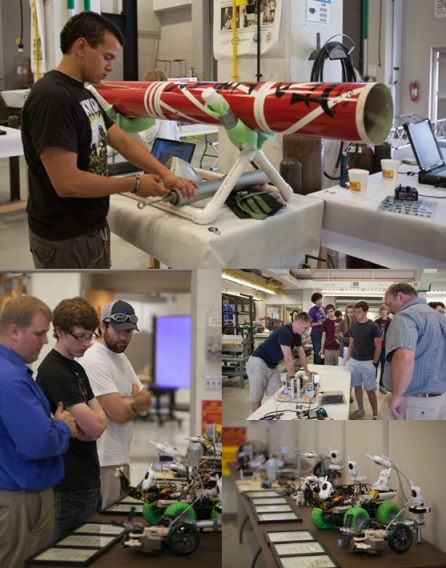Biology
Student projects on display at WKU Engineering Expo
- Monday, May 13th, 2013
From robots, wobblers and a radio-controlled helicopter to a concrete canoe, steel bridge and a rocket, the 2012-13 projects of WKU engineering students were on display Wednesday (May 8).

Student projects were on display May 8 during the 12th annual Engineering Expo. (WKU photos by Clinton Lewis)
During Engineering Expo Day, “every project that’s been completed or worked on for the whole semester can be demonstrated or displayed or explained,” said Dr. Julie Ellis, head of the Department of Engineering.
Gatton Academy students William Storrs of Kenton County, Will Johnson of Todd County and Matt Ruffner of Estill County demonstrated their four-rotored radio control helicopter for photography and photogrammetry applications. Sensors and a camera on board the helicopter gather data and photos.
“It’s amazing what these students can do when you give them a budget, lab space and freedom,” said Joel Lenoir, Bud Layne Professor in Mechanical Engineering.
Timothy Bucklew and Dustin Lovell, both seniors from Bowling Green, displayed an I-Robot First Responder 510 Pack-bot, a senior project developed through WKU’s Engineering-Manufacturing-Commercialization Center.
The I-Robot has a variety of uses for first responders and law enforcement agencies when responding to shootings, hostage situations, chemical spills or other situations. Similar robots were used after the recent Boston Marathon bombings.
Bucklew and Lovell said representatives of various organizations could be trained to use the device, which would remain at EMCC until needed. “We’re trying to get the word out to first responders in the community to make everyone safer,” Bucklew said.
Several projects for area industry were on display including a device to test firearms for Remington Research and Development in Elizabethtown. Seniors Jake Doran of Augusta, Ga., and Andrew Johnson of Greenville said the hands-on project was a good opportunity to put what they’re learning in engineering and science classes to use. Other members of the project team are Evan Pitt of Henderson and Andrew Keltner of St. Louis.
In addition to senior class projects and industry-sponsored projects, the 12th annual Engineering Expo included first-year class projects like balsa wood bridges and robotic bugs and products designed and built for competitions like concrete canoe, steel bridge and robots.
“All of these projects — every single one of them — is about helping students learn to be really competent practitioners of engineering,” Dr. Ellis said. “When they go out in the work world or they go to grad school or they go to the military or wherever they go, they’re ready to contribute from the get-go.”
The May 8 event included an engineering reunion to celebrate the 10th year of graduates from WKU’s Department of Engineering.
WKU began offering bachelor’s degrees in engineering in the fall of 2001 after the Council on Postsecondary Education approved a statewide agreement to offer joint engineering programs between WKU and the University of Kentucky and the University of Louisville. WKU’s engineering programs became fully accredited by ABET, Inc., in 2005.
The first class of students from the civil, mechanical and electrical engineering programs graduated in May 2004. As of spring 2013, WKU engineering has 460 graduates plus about 1,000 alumni of the previous engineering technology programs.
“WKU has produced a lot of great engineers, and now they are working out in the real world,” Dr. Ellis said.

